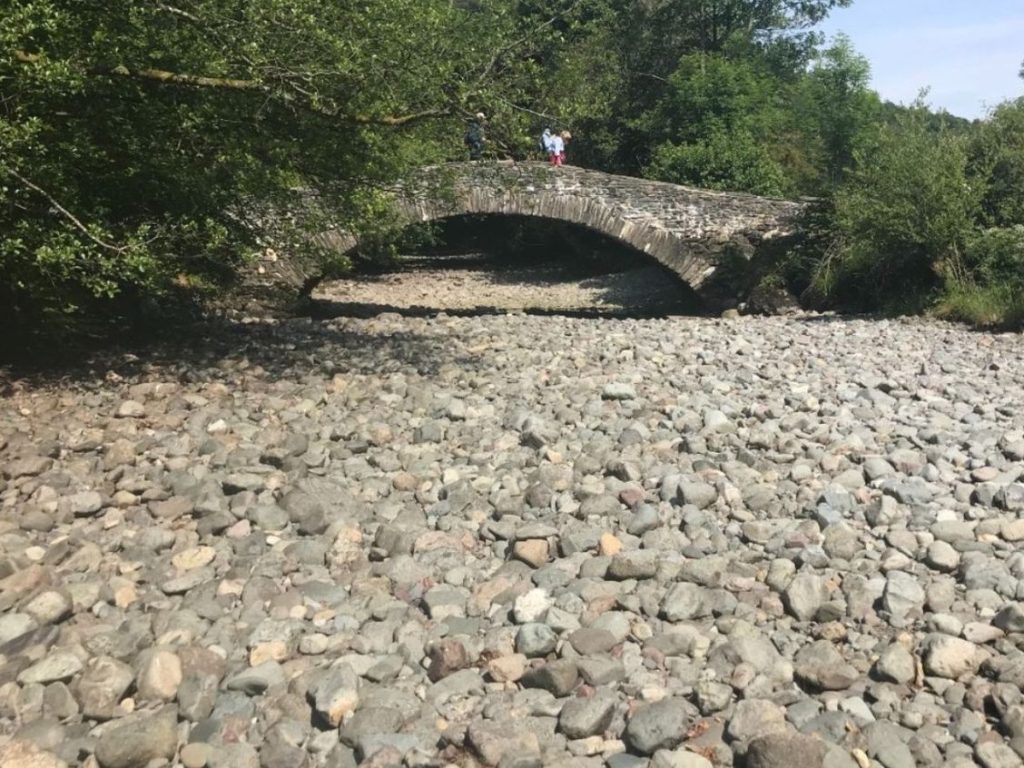
A scorching start to June has seen the River Derwent in Borrowdale ‘almost completely dry up’, local charities are warning today.
Temperatures of more than 25°C (77°F) over the last week and more hot weather forecast, has left one of the wettest places in England parched and resembling a rock-strewn beach.
The Keswick-based West Cumbria Rivers Trust and the National Trust are warning that the River Derwent through Borrowdale, near Keswick, is in “serious, prolonged, drought condition”.
The Borrowdale Valley is home to Seathwaite, in the foothills of England’s highest peak, Scafell Pike. Seathwaite records around 11ft of rain every year and is widely regarded as the wettest inhabited place in England, although the 2022-23 winter was unseasonally dry.
Rain gauges for Seathwaite Farm for the last five days show that not a drop of rain has been recorded, while the Met Office forecast for North West England suggests further high temperatures this week with the possibility of thundery showers.
It is now the third year in a row that the River Derwent, a major river flowing through the valley, has dried up almost completely, said officials.
Ruth Mackay, fisheries project officer for West Cumbria Rivers Trust, said: “We have images being sent in from around the valley of the rivers and tributaries bone dry. Already our nature is under stress. If a drought impacts a river, there is usually chance to recover in the succeeding years, but when it happens year after year, it becomes catastrophic for the wildlife that depend on it.”
She warned of “disastrous conditions” for wildlife across West Cumbria rivers. The two organisations have been undertaking award-winning river restoration work over the past few years to try and help the situation.
That’s part of a “Cumbria River Restoration strategy” to help mitigate the effects of climate change across the Derwent Catchment.
The catchment contains trout, salmon and eels, among others.
The National Trust’s “Riverland project” has also been delivering on several sites in the county. Stonethwaite, Borrowdale, had embankments removed and flood plains restored to help keep water in the land and at Dunthwaite, ponds were created and black poplars, an important wetland species that has all but disappeared from Cumbria, were successfully introduced.
As part of the Great North Bog project, the third phase of the Armboth peat bog restoration will be starting this autumn to help the land hold more water, supply water to rivers in times of drought and continue to capture carbon.
The hard work is paying off as these three sites are proving resilient to the recent droughts and keeping water in the ground for livestock and wildlife, it said.
Becky Powell, from the National Trust, said: “The Riverlands project has been working hard to deliver strategies which increase the resilience of our environment and communities to climate change. We have delivered projects across the Lake District, including in Ullswater where Goldrill Beck used to run dry, but is now still flowing despite the dry conditions. This not only helps the river and all the plants and wildlife which rely on it, but it also provides sustainable drinking water for livestock. Storing water in the landscape in this way not only makes it more resilient to drought and wildfire, but to flooding also.”
To help spread the word about the importance of healthy river systems, the Keswick Museum, in partnership with the Riverlands project and West Cumbria Rivers Trust, will be presenting an interactive exhibition starting 5th August, 2023.








